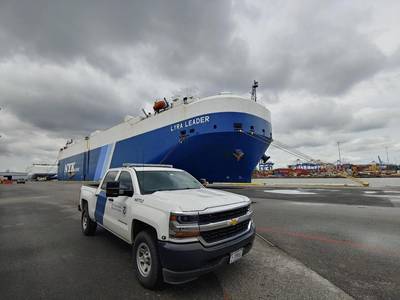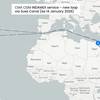Baltimore CBP Hits Agriculture Threat Trifecta
CBP Intercepts Five Destructive Asian Gypsy Moth Egg Masses on Three Vessels.
According to the U.S. Department of Agriculture (USDA), Asian Gypsy Moths are one of the most destructive insect pests in the world. They are not known to occur in the United States, yet they are knocking on our doorsteps. Three recent U.S. Customs and Border Protection (CBP) interceptions in Baltimore prove how hard CBP agriculture specialists are working to protect against Asian Gypsy Moths establishing here.
On July 19, Customs and Border Protection (CBP) agriculture specialists detected three suspected Asian Gypsy Moth (AGM) egg masses on the M/V Liberty Ace. On July 23 and again on July 26, CBP agriculture specialists detected one suspected AGM egg mass each on the M/V Lyra Leader and the M/V Energy Innovator, respectively. CBP submitted all three interceptions to the USDA entomologist who confirmed the egg masses likely be AGM through DNA testing.
The M/V Liberty Ace and M/V Lyra Leader are vehicle carriers; the M/V Energy Innovator is a liquefied natural gas (LNG) tanker. All three made port calls in Japan, a high-risk AGM area, during June 2019.
CBP agriculture specialists removed the egg masses and treated the affected area. “Alert Customs and Border Protection agriculture specialists detected and quickly mitigated a potentially serious threat posed by the highly invasive and destructive Asian Gypsy Moth,” said Casey Durst, CBP’s Director of the Baltimore Field Office. “CBP agriculture specialists continue to protect our nation’s agriculture and our economy through extraordinary vigilance and stringent inspections of merchant vessels and their cargo arriving into Baltimore.”
According to the USDA, AGM poses a significant threat to our nation’s forests and urban landscapes as it is known to be extremely mobile – females can travel up to 25 miles per day – can lay egg masses that could yield hundreds of hungry caterpillars, and is itself a voracious eater that attacks more than 500 species of trees and plants.
CBP agriculture specialists and USDA Animal and Plant Health Inspection Service (APHIS) inspectors have conducted training with Asian authorities to help lower AGM risks.
Additionally, vessels making port calls in Asia generally implement stringent inspections to detect and remove egg masses, and foreign governments in Asia inspect and certify that vessels departing their ports are free of AGM or egg masses.
CBP agriculture specialists perform a critical border security role in safeguarding America’s agricultural and natural resources from harmful pests and plant diseases. They have extensive training and experience in the biological sciences and agricultural inspection, inspect tens of thousands of international air passengers, and air and sea cargoes nationally being imported to the United States.
During a typical day last year, CBP agriculture specialists across the nation seized 4,552 prohibited plant, meat, animal byproduct, and soil, and intercepted 319 insect pests at U.S. ports of entry.













